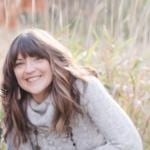Guest Post: Rev. Robyn Fickes Bles
Last week I received the call every pastor dreads. A beloved member of your flock has passed away. Though this man had an incredibly full and long life, it is still a deep hurt for the church family. And during COVID-19 distancing, this ache is made even greater by the absence of one another.
Of course, I got this call as I was hunkered down beneath my backyard umbrella, hiding from the blazing summer sun, two maniac preschoolers, and a barking dog. So basically, my office.
How does one provide a non-anxious, pastoral presence to someone who just lost their father, while you have soggy children crying out to push them on the swing for the 100th time? They are bursting with life, even as you bear witness to the fullness and completion that this life has to hold. Spanning this paradox of life and death has become the daily reality of parent/pastors.
It’s a delicate economy.
I have an amazing quran-team. We do child care swaps, providing space to go to the grocery store, fix the broken door, mow the lawn, and yes, the other work we get paid for.
I also have a fantastic church community. We listen to one another – on zoom – as we try to make the best COVID-19 related decisions. We gather for bible study and coffee hour – on zoom. We worship. We Zoom. I have preached from my dining room, literally bringing my home and church into the same space. This is holy. This is sacred. This is effing hard.
Yet, we’re doing it because we care. We care about our children and teachers. We care about the elderly members of my beloved church family. We care about the neighbors whose driveway we scoop in the winter time, and now drop groceries on their steps before running away. We don’t want to risk spreading too many germs, but we also want to make sure they have milk.
This is sacred and holy work. And, I say this is bananas. That’s right. Bananas. This clergy mama is tired and all high-dollar theological words went into quarantine about 3.5 months ago.
And it’s all made more exhausting by the toxic nature of political and ideological rhetoric surrounding this crisis. It is maddening that so many of us spend our every waking hour just trying to make it work– trying to make home work, make WORK work, make our communities work, and care for our neighbors– only to see that so many of our leaders are willing to sacrifice everything for the economy.
Yes, the economy truly does matter – but how we are defining that economy matters even more. If we’re saying we need to open up the bars and restaurants and issuing small business loans to keep companies afloat, but we’re cutting school budgets and teacher salaries, then we’re no better than Pharaoh, enslaving people and saying, “build more bricks.” For if our economy is about making Pharaoh rich, and building more buildings upon the backs of the poor, then we’re creating an empire economy.
But what we really need is oikos.

Oikos is the word used in Genesis, as God creates out of chaos.
Oikos is the root word for economy, ecology, and my church-nerd- self loves this one, ecumenical.
Oikos simply means care for the household. The care for the whole created order. And really, right now, I could use a little oikos-fairy to come and create some order out of the chaos of my life. And the whole world, for that matter.
If we think that “economy” doesn’t include public health, then I call bananas; because health is part of the household.
This past week my local school district began the difficult task of communicating their return-to-learn plan for the fall. I cannot begin to comprehend the task of administrators and educators to make an all-encompassing plan for families and communities that have differing needs. We are asking them to literally build larger-than-life-pyramids; while cutting their budgets and shortening their straw supply. We overwork the labor force all while demanding – keep going. Do more. Make more bricks. Build more towers.
If you want to talk about economy, then we have to look at the whole picture. The economy of this particular school district looks like this: not only is it the largest school district in the state, it is one of the largest employers in the entire state. Over 5,000 people are employed by this school district. And that’s not even counting the families they serve. Over 33,000 students are part of these school communities. Each of those 33,000 students have parents working for employers. Many of these parents are deciding if they can live off one income, so another parent– predominantly women– will stay home to provide the 3-4 days of virtual learning.
Many of these 33,000 students have grandparents, aunts, uncles, family friends, who are also sacrificing their work time to support one another. To provide a safe and enriching environment for children– because we are not providing our schools, our teachers, or our administrators the resources they need to do their job.
If we are truly concerned about the economy, then let’s talk about how we will. When we take care of the schools; then the rest of the economy will fall into place. Teachers will be supported. Children will be safe and nurtured. Parents and care-givers can return to their respective workplaces.
Empire wants more bricks. More money. More towers.
Economy calls for the care and support of the community; the sharing of resources and the banding together when things are hard and resources are scarce. We know which way is Pharaoh’s way; and which is the way of God’s created order.
As one household in this great household, the ways we care for the vulnerable reflect our truth: do we have an economy at all? Or do we have an empire?
Pharaoh had one thing right. In order to build something, you have to lay a foundation. But in order to actually build a pyramid, you have to start with the broadest base possible. Schools are the broadest, most encompassing foundation of our economy. When we start there, everyone and everything else will fall into place.
Many of us are already living the reality of an oikos economy. We have our make-shift home offices tucked away behind piles of laundry. We have learned how to field business calls while making lunches. We know how to check in on our elderly neighbors and parents while also sending that work email. We know how to throw that mask on as we pull up to the drive-thru window. This is the whole created order, working together to care for one another. This is how we build a stronger house– not more towers.

Robyn Bles is mom to Rosey Jo and Senior Minister with the good people of Wakonda Christian Church, in Des Moines Iowa. Thankfully Robyn, RJ and their dog Stella have been able to continue their favorite socially distant activities, hiking and bike riding.












